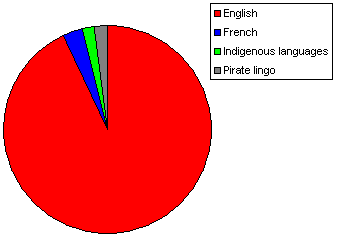Long long ago, when the Queen's empire was still blossoming, many British explorers (hereafter referred to as "Sea Limeys") travelled the South Pacific, taking over whatever they could find. The rest of the South Pacific was taken over by Dutch and French explorers (hereafter referred to as "Windmill monkeys" and "Associates of that dude with the goatee from The Matrix: Reloaded," respectively). One of the territories the Sea Limeys claimed was Vanuatu, a loosely-organised collection of islands. These islands' inhabitants had very different cultures and very different languages from each other, a result of the minimal inter-island interaction. This became a problem when the Sea Limeys relocated all the Vanuatuans onto a few large islands, regardless of island of origin, and stuck them on a few big sugar plantations. The vast lingual differences proved to be a problem at first: no one could communicate with anyone else. Eventually, however, they began to craft a very simple language based on what they heard from the Sea Limey masters' speaking. This led to a very reduced version of English, one that was simple to learn. Since almost all the words were English cognates, it allowed Vanuatuans to communicate reasonably well with their oppressive Sea Limey overlords as well as with each other.
Oddly enough, they chose to name the language Bislama, from the French words "bêche de mer," meaning "sea cucumber." Why anyone would name their language after a creature who regularly defenestrates itself on purpose is a mystery to me. This also seems odd because bêche de mer is French, not English. While most words came (and still do come) from English, a fair number came from other sources. Here's a breakdown of the sources of Bislama's vocabulary:

Common pirate lingo words include "save," (pronounced suh-vay), which means "to know" and comes from the pirate-lingo word "savvy." Similarly, the word for "child" is "pikanini" which comes from "pickaninny." Please note that words that would be construed as offencive in English, like "pickaninny" and "shit," are used in Bislama as perfectly innocent, legitimate words.
Learn some more basic words next time, in ULWPP Part 2: Bislama sentences!
